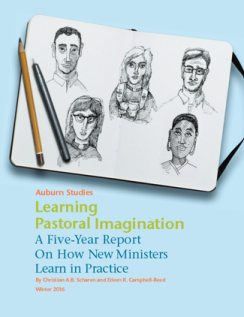
7 Selected Items
Select an item by clicking its checkbox
Additional Info:
This Auburn Studies report highlights the changing features of online distance education (ODE) within theological schools. Distance education is not a new phenomenon, particularly within the broader field of higher education, and yet the “disruptive innovation” of the internet, as Clayton Christensen and others have argued, has only recently begun to change theological education.[i] While in some respects the impact of the internet is dramatic and new, many faith ...
This Auburn Studies report highlights the changing features of online distance education (ODE) within theological schools. Distance education is not a new phenomenon, particularly within the broader field of higher education, and yet the “disruptive innovation” of the internet, as Clayton Christensen and others have argued, has only recently begun to change theological education.[i] While in some respects the impact of the internet is dramatic and new, many faith ...
Additional Info:
This Auburn Studies report highlights the changing features of online distance education (ODE) within theological schools. Distance education is not a new phenomenon, particularly within the broader field of higher education, and yet the “disruptive innovation” of the internet, as Clayton Christensen and others have argued, has only recently begun to change theological education.[i] While in some respects the impact of the internet is dramatic and new, many faith traditions have deep experience with the sort of mediated presence distinctive of ODE.
For many world religions, the embodied presence of their founders—Moses, Jesus, Mohammad, Buddha, and others—was brief. For most of the histories of these great traditions, “not being there” has been normative. Take, for example, the story of Jesus’ post-resurrection appearance to the disciples in the Gospel of John. All the disciples were there, save Thomas, who would not believe Jesus was truly alive without “being there” to see and touch Jesus. Lucky for him, a week later Jesus appeared to Thomas as well. But note what Jesus said: “Have you believed because you have seen me? Blessed are those who have not seen and have come to believe.” This is the case for millions of believers today, whose experience of the holy is through a mediating presence, holy objects, or rituals, and perhaps, most profoundly, through scriptures understood as God’s presence, voice, or word.
It is then not an unfamiliar world at all for people of faith to teach and learn at a distance, using mediated relationships to do so—even when the technology affording the connection is indeed new. While this report outlines our research findings, we also hope to offer resources for thinking in creative and hopeful ways in a time of change. The report takes stock of a generation of change in theological education driven by what is often called the “digital revolution.” We highlight three key findings:
First, ODE is growing rapidly, pushing the boundaries of who typically attends theological school. Over the past decade, enrollment at member schools of The Association of Theological Schools (ATS) dropped by 11%; in the same period, online enrollment rose almost 200%. Broader cultural patterns regarding spirituality are surely at play as we see the democratizing force of the internet opening theological exploration to a much wider—and, it turns out, quite interested—audience. Given the success of ODE, many schools suddenly find themselves with too large and expensive a physical plant for the educational needs.
Second, ODE student outcomes are equal to or better than those of traditional residential classes. Many critics—even now—harbor doubts that anything but students and a professor in a room together can achieve the desired educational outcomes. Yet the evidence shows this is not true. ODE provokes pedagogical innovation, shifting the focus from teacher to learner, and the power of the contexts in which the student learns. For both faculty and students, it is powerful to take seriously the “real world” context where student learning and daily work dynamically interrogate one another. Ironically, we found, while ODE takes more time and effort, remarkably few resources are currently dedicated to training and supporting faculty as they learn this new medium.
Third, the integrated reality of digital life is quickly making the old divide between “traditional” and “online” classes—and hybrid courses or programs, which toggle between the two—obsolete. ODE creates an identity crisis for many schools that value highly the formative power of “being there” in classroom, chapel, and community life. Yet the question the disruption of the internet raises is “where” does education actually happen? It is clearly wherever the student lives, works, and learns, including in virtual spaces and through digitally mediated access to human and material resources.
Table Of Content:
Executive Summary
I. Introduction
II. Overview of Literature
----Case Study: Bethel Seminary
III. Whats, Whys, and Hows of Online Distance Education
----Case Study: Luther Seminary
IV. Why Say Yes to ODE?
----Case Study: Central Baptist Theological Seminary
V. Challenges for ODE
----Case Study: Columbia Theological Seminary
VI. How to Jumpstart ODE
VII. Conclusions
Sage Advice: How to Do it Well
Data Sources
About the Authors, Funding and Support
This Auburn Studies report highlights the changing features of online distance education (ODE) within theological schools. Distance education is not a new phenomenon, particularly within the broader field of higher education, and yet the “disruptive innovation” of the internet, as Clayton Christensen and others have argued, has only recently begun to change theological education.[i] While in some respects the impact of the internet is dramatic and new, many faith traditions have deep experience with the sort of mediated presence distinctive of ODE.
For many world religions, the embodied presence of their founders—Moses, Jesus, Mohammad, Buddha, and others—was brief. For most of the histories of these great traditions, “not being there” has been normative. Take, for example, the story of Jesus’ post-resurrection appearance to the disciples in the Gospel of John. All the disciples were there, save Thomas, who would not believe Jesus was truly alive without “being there” to see and touch Jesus. Lucky for him, a week later Jesus appeared to Thomas as well. But note what Jesus said: “Have you believed because you have seen me? Blessed are those who have not seen and have come to believe.” This is the case for millions of believers today, whose experience of the holy is through a mediating presence, holy objects, or rituals, and perhaps, most profoundly, through scriptures understood as God’s presence, voice, or word.
It is then not an unfamiliar world at all for people of faith to teach and learn at a distance, using mediated relationships to do so—even when the technology affording the connection is indeed new. While this report outlines our research findings, we also hope to offer resources for thinking in creative and hopeful ways in a time of change. The report takes stock of a generation of change in theological education driven by what is often called the “digital revolution.” We highlight three key findings:
First, ODE is growing rapidly, pushing the boundaries of who typically attends theological school. Over the past decade, enrollment at member schools of The Association of Theological Schools (ATS) dropped by 11%; in the same period, online enrollment rose almost 200%. Broader cultural patterns regarding spirituality are surely at play as we see the democratizing force of the internet opening theological exploration to a much wider—and, it turns out, quite interested—audience. Given the success of ODE, many schools suddenly find themselves with too large and expensive a physical plant for the educational needs.
Second, ODE student outcomes are equal to or better than those of traditional residential classes. Many critics—even now—harbor doubts that anything but students and a professor in a room together can achieve the desired educational outcomes. Yet the evidence shows this is not true. ODE provokes pedagogical innovation, shifting the focus from teacher to learner, and the power of the contexts in which the student learns. For both faculty and students, it is powerful to take seriously the “real world” context where student learning and daily work dynamically interrogate one another. Ironically, we found, while ODE takes more time and effort, remarkably few resources are currently dedicated to training and supporting faculty as they learn this new medium.
Third, the integrated reality of digital life is quickly making the old divide between “traditional” and “online” classes—and hybrid courses or programs, which toggle between the two—obsolete. ODE creates an identity crisis for many schools that value highly the formative power of “being there” in classroom, chapel, and community life. Yet the question the disruption of the internet raises is “where” does education actually happen? It is clearly wherever the student lives, works, and learns, including in virtual spaces and through digitally mediated access to human and material resources.
Table Of Content:
Executive Summary
I. Introduction
II. Overview of Literature
----Case Study: Bethel Seminary
III. Whats, Whys, and Hows of Online Distance Education
----Case Study: Luther Seminary
IV. Why Say Yes to ODE?
----Case Study: Central Baptist Theological Seminary
V. Challenges for ODE
----Case Study: Columbia Theological Seminary
VI. How to Jumpstart ODE
VII. Conclusions
Sage Advice: How to Do it Well
Data Sources
About the Authors, Funding and Support
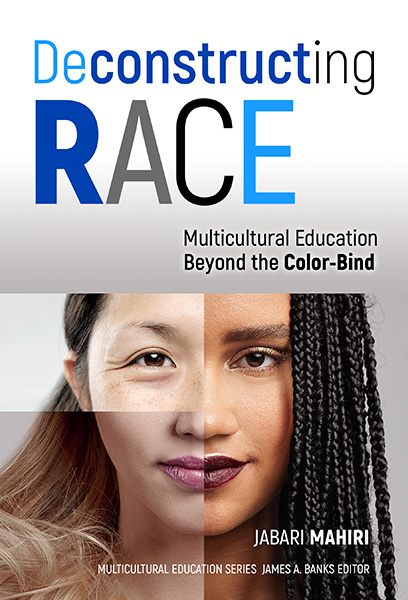
Deconstructing Race - Multicultural Education Beyond the Color-Blind
Additional Info:
Click Here for Book Review
How do socially constructed concepts of race dominate and limit understandings and practices of multicultural education? Since race is socially constructed, how do we deconstruct it?
In this important book Mahiri argues that multicultural education needs to move beyond racial categories defined and sustained by the ideological, social, political, and ...
Click Here for Book Review
How do socially constructed concepts of race dominate and limit understandings and practices of multicultural education? Since race is socially constructed, how do we deconstruct it?
In this important book Mahiri argues that multicultural education needs to move beyond racial categories defined and sustained by the ideological, social, political, and ...
Additional Info:
Click Here for Book Review
How do socially constructed concepts of race dominate and limit understandings and practices of multicultural education? Since race is socially constructed, how do we deconstruct it?
In this important book Mahiri argues that multicultural education needs to move beyond racial categories defined and sustained by the ideological, social, political, and economic forces of white supremacy. Exploring contemporary and historical scholarship on race, the emergence of multiculturalism, and the rise of the digital age, the author investigates micro-cultural practices and provides a compelling framework for understanding the diversity of individuals and groups.
Descriptions and analysis from ethnographic interviews reveal how people’s continually evolving, highly distinctive, micro-cultural identities and affinities provide understandings of diversity not captured within assigned racial categories.
Synthesizing the scholarship and interview findings, the final chapter connects the play of micro-cultures in people’s lives to a needed shift in how multicultural education uses race to frame and comprehend diversity and identity and provides pedagogical examples of how this shift can look in teaching practices.
Table Of Content:
Acknowledgements
Ch 1. Writing Wrongs
Ch 2. Deconstructing Race
Ch 3. The ColorBind
Ch 4. Pretending to Be White
Ch 5. Passing for Black
Ch 6. No Bodys Yellow
Ch 7. The Brown Box
Ch 8. Red Rum
Ch 9. MicroCultures
Ch 10. Challenges of Multicultural Education
Appendix A: Personal Perspectives Project (Shivani Savdharia)
Appendix B: From Beirut to Oakland (Yael Friedman)
Appendix C: Integrating Restorative Discipline Principles into Classroom Content (Eva Marie Oliver)
Appendix D: Personal Profile (Kylie Garcia)
References
Index
About the Author
Click Here for Book Review
How do socially constructed concepts of race dominate and limit understandings and practices of multicultural education? Since race is socially constructed, how do we deconstruct it?
In this important book Mahiri argues that multicultural education needs to move beyond racial categories defined and sustained by the ideological, social, political, and economic forces of white supremacy. Exploring contemporary and historical scholarship on race, the emergence of multiculturalism, and the rise of the digital age, the author investigates micro-cultural practices and provides a compelling framework for understanding the diversity of individuals and groups.
Descriptions and analysis from ethnographic interviews reveal how people’s continually evolving, highly distinctive, micro-cultural identities and affinities provide understandings of diversity not captured within assigned racial categories.
Synthesizing the scholarship and interview findings, the final chapter connects the play of micro-cultures in people’s lives to a needed shift in how multicultural education uses race to frame and comprehend diversity and identity and provides pedagogical examples of how this shift can look in teaching practices.
Table Of Content:
Acknowledgements
Ch 1. Writing Wrongs
Ch 2. Deconstructing Race
Ch 3. The ColorBind
Ch 4. Pretending to Be White
Ch 5. Passing for Black
Ch 6. No Bodys Yellow
Ch 7. The Brown Box
Ch 8. Red Rum
Ch 9. MicroCultures
Ch 10. Challenges of Multicultural Education
Appendix A: Personal Perspectives Project (Shivani Savdharia)
Appendix B: From Beirut to Oakland (Yael Friedman)
Appendix C: Integrating Restorative Discipline Principles into Classroom Content (Eva Marie Oliver)
Appendix D: Personal Profile (Kylie Garcia)
References
Index
About the Author
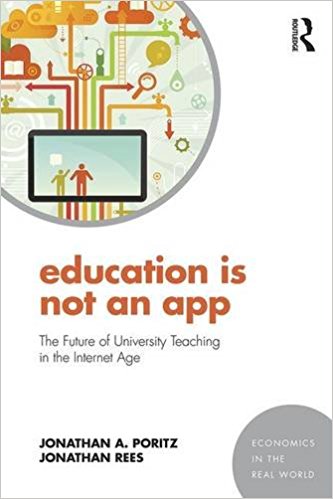
Education Is Not an App: The Future of University Teaching in the Internet Age
Additional Info:
Click Here for Book Review
Whilst much has been written about the doors that technology can open for students, less has been said about its impact on teachers and professors. Although technology undoubtedly brings with it huge opportunities within higher education, there is also the fear that it will have a negative effect both on faculty and ...
Click Here for Book Review
Whilst much has been written about the doors that technology can open for students, less has been said about its impact on teachers and professors. Although technology undoubtedly brings with it huge opportunities within higher education, there is also the fear that it will have a negative effect both on faculty and ...
Additional Info:
Click Here for Book Review
Whilst much has been written about the doors that technology can open for students, less has been said about its impact on teachers and professors. Although technology undoubtedly brings with it huge opportunities within higher education, there is also the fear that it will have a negative effect both on faculty and on teaching standards.
Education Is Not an App offers a bold and provocative analysis of the economic context within which educational technology is being implemented, not least the financial problems currently facing higher education institutions around the world. The book emphasizes the issue of control as being a key factor in whether educational technology is used for good purposes or bad purposes, arguing that technology has great potential if placed in caring hands. Whilst it is a guide to the newest developments in education technology, it is also a book for those faculty, technology professionals, and higher education policy-makers who want to understand the economic and pedagogical impact of technology on professors and students. It advocates a path into the future based on faculty autonomy, shared governance, and concentration on the university’s traditional role of promoting the common good.
Offering the first critical, in-depth assessment of the political economy of education technology, this book will serve as an invaluable guide to concerned faculty, as well as to anyone with an interest in the future of higher education.
Table Of Content:
Preface
Ch 1. Introduction
Ch 2. Online Education: The Good, the Bad and the Ugly
Ch 3. MOOCs
Ch 4. Free/Libre/Open-Source Edtech
Ch 5. Unbundling
Ch 6. Electronic Taylorism
Ch 7. Social Media in the Classroom and Out
Ch 8. The Zero-Marginal-Cost Education
Ch 9. Conclusion: Higher Education in a Digital Age
Appendix: Jonathans’ Laws
Bibliography
Index
Click Here for Book Review
Whilst much has been written about the doors that technology can open for students, less has been said about its impact on teachers and professors. Although technology undoubtedly brings with it huge opportunities within higher education, there is also the fear that it will have a negative effect both on faculty and on teaching standards.
Education Is Not an App offers a bold and provocative analysis of the economic context within which educational technology is being implemented, not least the financial problems currently facing higher education institutions around the world. The book emphasizes the issue of control as being a key factor in whether educational technology is used for good purposes or bad purposes, arguing that technology has great potential if placed in caring hands. Whilst it is a guide to the newest developments in education technology, it is also a book for those faculty, technology professionals, and higher education policy-makers who want to understand the economic and pedagogical impact of technology on professors and students. It advocates a path into the future based on faculty autonomy, shared governance, and concentration on the university’s traditional role of promoting the common good.
Offering the first critical, in-depth assessment of the political economy of education technology, this book will serve as an invaluable guide to concerned faculty, as well as to anyone with an interest in the future of higher education.
Table Of Content:
Preface
Ch 1. Introduction
Ch 2. Online Education: The Good, the Bad and the Ugly
Ch 3. MOOCs
Ch 4. Free/Libre/Open-Source Edtech
Ch 5. Unbundling
Ch 6. Electronic Taylorism
Ch 7. Social Media in the Classroom and Out
Ch 8. The Zero-Marginal-Cost Education
Ch 9. Conclusion: Higher Education in a Digital Age
Appendix: Jonathans’ Laws
Bibliography
Index
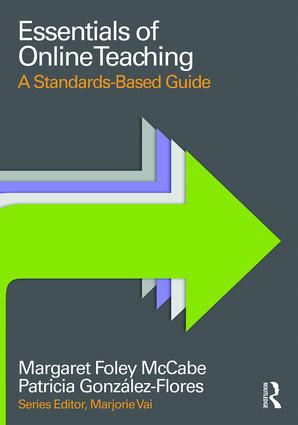
Essentials of Online Teaching: A Standards-Based Guide
Additional Info:
Click Here for Book Review
Teachers’ active online participation and engagement with students are critical factors to the success of online courses. Essentials of Online Teaching is a standards-based, straightforward guide to teaching online in higher education, high school and vocational training, or corporate learning environments. This brief but powerful book encourages immediate application of concepts with ...
Click Here for Book Review
Teachers’ active online participation and engagement with students are critical factors to the success of online courses. Essentials of Online Teaching is a standards-based, straightforward guide to teaching online in higher education, high school and vocational training, or corporate learning environments. This brief but powerful book encourages immediate application of concepts with ...
Additional Info:
Click Here for Book Review
Teachers’ active online participation and engagement with students are critical factors to the success of online courses. Essentials of Online Teaching is a standards-based, straightforward guide to teaching online in higher education, high school and vocational training, or corporate learning environments. This brief but powerful book encourages immediate application of concepts with the help of real-world examples, technical insights, and professional advice.
The guide includes:
- a practical approach informed by, but not about, relevant learning theories;
- clear models and examples from a wide variety of online courses;
- teachers’ reflections about their online practice;
- a checklist of standards to help guide teaching decisions; and
- an accompanying website (www.essentialsofonlineteaching.com) with additional resources.
Essentials of Online Teaching addresses key instructional challenges in online teaching and presents the reader with practical solutions for each phase of a course—preparation, beginning, middle, and end. (From the Publisher)
Table Of Content:
Acknowledgements
Foreword
About the Authors
Introduction to this Guide
Ch 1. Orientation to Online Teaching
Ch 2. Factors that Influence Online Teaching
Ch 3. Teaching with Digital Tools and Resources
Ch 4. Preparing to Teach Online
Ch 5. The Beginning Weeks: Launching an Online Course
Ch 6. The Middle Weeks: Facilitating Online Learning
Ch 7. The Ending Weeks: Synthesizing and Extending Learning
Ch 8. Online Collaboration
Ch 9. Online Assessment
Ch 10. Pulling It All Together: An Online Teacher in Action
Appendix A: Using the Standards Checklist
Index
Click Here for Book Review
Teachers’ active online participation and engagement with students are critical factors to the success of online courses. Essentials of Online Teaching is a standards-based, straightforward guide to teaching online in higher education, high school and vocational training, or corporate learning environments. This brief but powerful book encourages immediate application of concepts with the help of real-world examples, technical insights, and professional advice.
The guide includes:
- a practical approach informed by, but not about, relevant learning theories;
- clear models and examples from a wide variety of online courses;
- teachers’ reflections about their online practice;
- a checklist of standards to help guide teaching decisions; and
- an accompanying website (www.essentialsofonlineteaching.com) with additional resources.
Essentials of Online Teaching addresses key instructional challenges in online teaching and presents the reader with practical solutions for each phase of a course—preparation, beginning, middle, and end. (From the Publisher)
Table Of Content:
Acknowledgements
Foreword
About the Authors
Introduction to this Guide
Ch 1. Orientation to Online Teaching
Ch 2. Factors that Influence Online Teaching
Ch 3. Teaching with Digital Tools and Resources
Ch 4. Preparing to Teach Online
Ch 5. The Beginning Weeks: Launching an Online Course
Ch 6. The Middle Weeks: Facilitating Online Learning
Ch 7. The Ending Weeks: Synthesizing and Extending Learning
Ch 8. Online Collaboration
Ch 9. Online Assessment
Ch 10. Pulling It All Together: An Online Teacher in Action
Appendix A: Using the Standards Checklist
Index
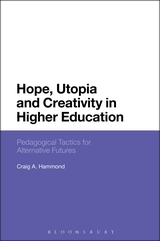
Hope, Utopia and Creativity in Higher Education: Pedagogical Tactics for Alternative Futures
Additional Info:
Click Here for Book Review
Reappraising ideas associated with Ernst Bloch, Roland Barthes and Gaston Bachelard within the context of a utopian pedagogy, Hope, Utopia and Creativity in Higher Education reframes the transformative, creative and collaborative potential of education offering new concepts, tactics and pedagogical possibilities. Craig A. Hammond explores ways of analysing and democratising not only ...
Click Here for Book Review
Reappraising ideas associated with Ernst Bloch, Roland Barthes and Gaston Bachelard within the context of a utopian pedagogy, Hope, Utopia and Creativity in Higher Education reframes the transformative, creative and collaborative potential of education offering new concepts, tactics and pedagogical possibilities. Craig A. Hammond explores ways of analysing and democratising not only ...
Additional Info:
Click Here for Book Review
Reappraising ideas associated with Ernst Bloch, Roland Barthes and Gaston Bachelard within the context of a utopian pedagogy, Hope, Utopia and Creativity in Higher Education reframes the transformative, creative and collaborative potential of education offering new concepts, tactics and pedagogical possibilities. Craig A. Hammond explores ways of analysing and democratising not only pedagogical conception, knowledge and delivery, but also the learning experience, and processes of negotiation and peer-assessment. Hammond shows how the incorporation of already existent learner hopes, daydreams, and creative possibilities can open up new opportunities for thinking about popular culture and memory, learning and knowledge, and collaborative communities of support. Drawing together theoretical and cultural material in a teaching and learning environment of empowerment, Hammond illustrates that formative articulations of alternative, utopian futures, across sociological, humanities, and education studies subjects and curricula, becomes possible.
Table Of Content:
Acknowledgements
Ch 1. Introduction: Critical Pedagogies – Horizons of Possibility
Part I: Tactics: Conceptualising Hope, Utopia & Creativity
Ch 2. Ernst Bloch, Hope and Utopia: The Stuff of Possibility
Ch 3. Roland Barthes: Punctum! The Death of the Author
Ch 4. Gaston Bachelard: Poetics, Space & Daydreaming
Part II: Pedagogical Strategies for Creative Possibilities
Ch 5. Dérive and Détournement: Pedagogical Strategies for Creative Engagement
Ch 6. Bye Bye Badman: The Redemption of Hope through Popular Culture
Ch 7. The Wisdom of the Crowd: Liberating Creativity
Part III: Learner Stories, Reflections and Projections
Ch 8. A Garland of Rhythms
Ch 9. Encounters, Stories, Connections
Ch 10. Beyond the Trace: Reflections from Past Learners
Ch 11. Conclsion Elpis/Eidos – Elpeidetics: Hopeful Visions?
Appendix 1: Student Contact Emails
Appendix 2: Student Information, Questionnaire and Permissions
Bibliography
Index
Click Here for Book Review
Reappraising ideas associated with Ernst Bloch, Roland Barthes and Gaston Bachelard within the context of a utopian pedagogy, Hope, Utopia and Creativity in Higher Education reframes the transformative, creative and collaborative potential of education offering new concepts, tactics and pedagogical possibilities. Craig A. Hammond explores ways of analysing and democratising not only pedagogical conception, knowledge and delivery, but also the learning experience, and processes of negotiation and peer-assessment. Hammond shows how the incorporation of already existent learner hopes, daydreams, and creative possibilities can open up new opportunities for thinking about popular culture and memory, learning and knowledge, and collaborative communities of support. Drawing together theoretical and cultural material in a teaching and learning environment of empowerment, Hammond illustrates that formative articulations of alternative, utopian futures, across sociological, humanities, and education studies subjects and curricula, becomes possible.
Table Of Content:
Acknowledgements
Ch 1. Introduction: Critical Pedagogies – Horizons of Possibility
Part I: Tactics: Conceptualising Hope, Utopia & Creativity
Ch 2. Ernst Bloch, Hope and Utopia: The Stuff of Possibility
Ch 3. Roland Barthes: Punctum! The Death of the Author
Ch 4. Gaston Bachelard: Poetics, Space & Daydreaming
Part II: Pedagogical Strategies for Creative Possibilities
Ch 5. Dérive and Détournement: Pedagogical Strategies for Creative Engagement
Ch 6. Bye Bye Badman: The Redemption of Hope through Popular Culture
Ch 7. The Wisdom of the Crowd: Liberating Creativity
Part III: Learner Stories, Reflections and Projections
Ch 8. A Garland of Rhythms
Ch 9. Encounters, Stories, Connections
Ch 10. Beyond the Trace: Reflections from Past Learners
Ch 11. Conclsion Elpis/Eidos – Elpeidetics: Hopeful Visions?
Appendix 1: Student Contact Emails
Appendix 2: Student Information, Questionnaire and Permissions
Bibliography
Index
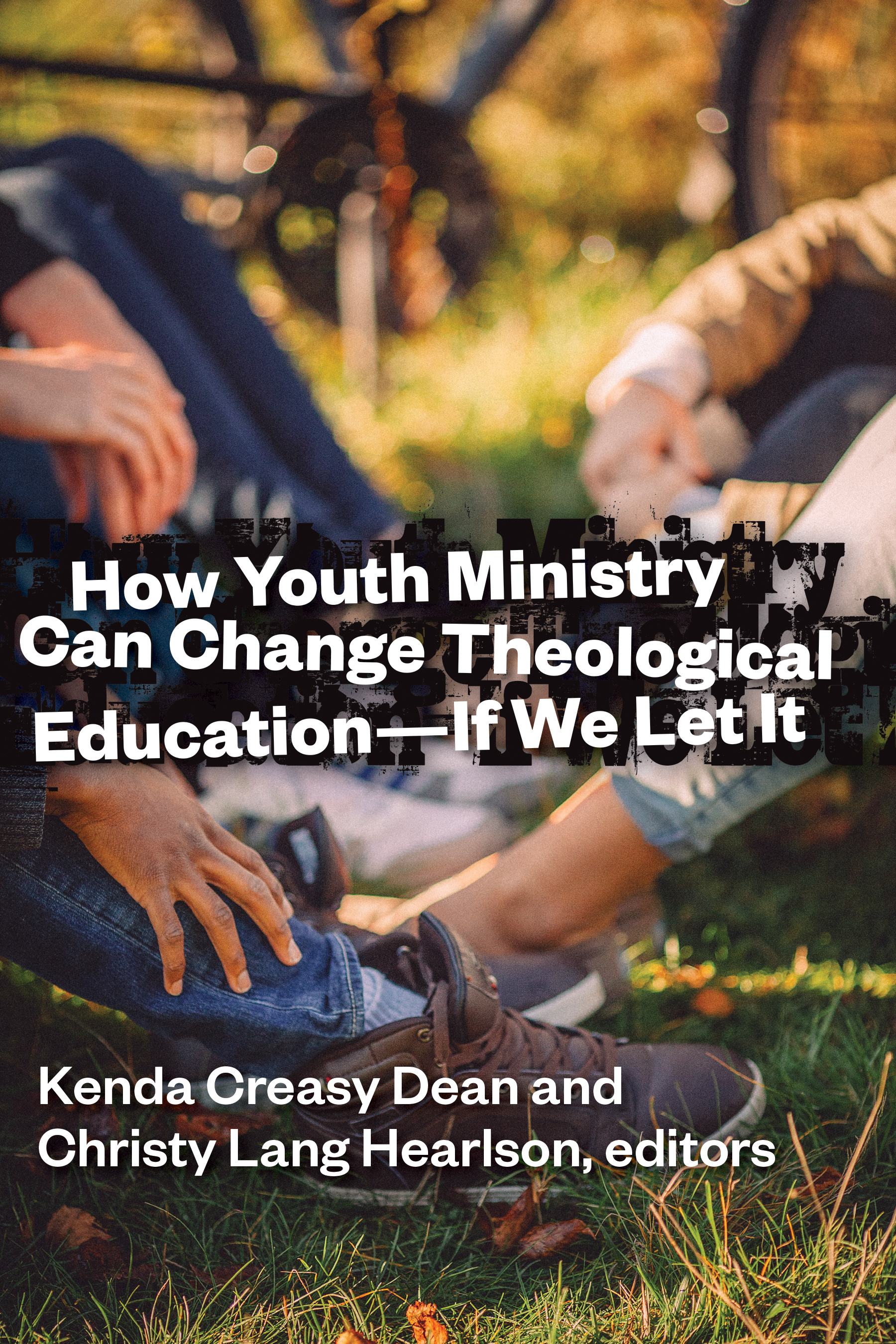
How Youth Ministry Can Change Theological Education - If We Let It
Additional Info:
Click Here for Book Review
Since 1993, forty-nine theological seminaries have created opportunities for high school students to participate in on-campus High School Theology Programs (HSTPs) that invite them to engage in serious biblical and theological study. Many of the young people who take part in these programs go on to become pastoral or lay leaders in their ...
Click Here for Book Review
Since 1993, forty-nine theological seminaries have created opportunities for high school students to participate in on-campus High School Theology Programs (HSTPs) that invite them to engage in serious biblical and theological study. Many of the young people who take part in these programs go on to become pastoral or lay leaders in their ...
Additional Info:
Click Here for Book Review
Since 1993, forty-nine theological seminaries have created opportunities for high school students to participate in on-campus High School Theology Programs (HSTPs) that invite them to engage in serious biblical and theological study. Many of the young people who take part in these programs go on to become pastoral or lay leaders in their churches. What has made these programs so successful — especially given the well-documented "crisis of faith" among young people today?
In this book thirteen contributors — many of whom have created or led one of these innovative theology programs — investigate answers to this question. They examine the pedagogical practices the HSTPs have in common and explore how they are contributing to the leadership of the church. They then show how the lessons gleaned from these successful programs can help churches, denominations, and seminaries reimagine both theological education and youth ministry.
Table Of Content:
PART ONE
A More Excellent Way: Vocational Discernment as a Practice of Christian Community
Ch 1. Taste Tests and Teenagers: Vocational Discernment as a Creative Social Practice (Kenda Creasy Dean and Christy Lang Hearlson)
Ch 2. Calling as Creative Process: Wicked Questions for Theological Education (Kenda Creasy Dean and Christy Lang Hearlson)
PART TWO
MORE THAN A JOB FAIR: CREATING CULTURES OF VOCATIONAL DISCERNMENT
Ch 3. Catalyzing Community: Forming the Community as Catechist (Anabel Proffitt and Jacquie Church Young)
Ch 4. Give Me Mentors: Pedagogies of Spiritual Accompaniment (Anne Streaty Wimberly)
Ch 5. Holy Noticing: The Power of Nominations and Commissioning for Missional Formation (Katherine M. Douglass)
Ch 6. Taking It Home: Separation and Reintegration as Teachable Moments (Christy Lang Hearlson)
PART THREE
More Than Summer Camp: Adventures in Vocational Pedagogies
Ch 7. Getting All Turned Around: Truth, Disruption, and Reorientation in High School Teology Programs (Andrew Brubacher Kaethler)
Ch 8. Fuel My Faith: Padagogies of Theological Reflection in High School Theoloogy Programs (Jeffrey Kaster)
Ch 9. The Formative Power of Awe: Pedagogies of Worship and Wonder (Fred Edie)
Ch 10. Prepare Me for a Worthy Adventure: Pedagogies of Pilgrimage in Adolescent Formation (David Horn)
Ch 11. Let Me Try: Experiential Learning in the Theological Formation of Young People (Judy Steers)
PART FOUR
More than Teenagers: Vocational Discernment in the Lives of Program Staff, Faculty, and Theological Institutions
Ch 12. Becoming Christ's Hands and Feet in the World: The Vocational Formation of Staff (Elizabeth W. Corrie)
Ch 13. Teaching in a New Key: The Pedagogical Formation of Theological Faculty (Brent A. Strawn)
Ch 14. Hitting It Out of the Park: Why Churches Need Farm Teams (Kenda Creasy Dean)
Appendixes
Index
Click Here for Book Review
Since 1993, forty-nine theological seminaries have created opportunities for high school students to participate in on-campus High School Theology Programs (HSTPs) that invite them to engage in serious biblical and theological study. Many of the young people who take part in these programs go on to become pastoral or lay leaders in their churches. What has made these programs so successful — especially given the well-documented "crisis of faith" among young people today?
In this book thirteen contributors — many of whom have created or led one of these innovative theology programs — investigate answers to this question. They examine the pedagogical practices the HSTPs have in common and explore how they are contributing to the leadership of the church. They then show how the lessons gleaned from these successful programs can help churches, denominations, and seminaries reimagine both theological education and youth ministry.
Table Of Content:
PART ONE
A More Excellent Way: Vocational Discernment as a Practice of Christian Community
Ch 1. Taste Tests and Teenagers: Vocational Discernment as a Creative Social Practice (Kenda Creasy Dean and Christy Lang Hearlson)
Ch 2. Calling as Creative Process: Wicked Questions for Theological Education (Kenda Creasy Dean and Christy Lang Hearlson)
PART TWO
MORE THAN A JOB FAIR: CREATING CULTURES OF VOCATIONAL DISCERNMENT
Ch 3. Catalyzing Community: Forming the Community as Catechist (Anabel Proffitt and Jacquie Church Young)
Ch 4. Give Me Mentors: Pedagogies of Spiritual Accompaniment (Anne Streaty Wimberly)
Ch 5. Holy Noticing: The Power of Nominations and Commissioning for Missional Formation (Katherine M. Douglass)
Ch 6. Taking It Home: Separation and Reintegration as Teachable Moments (Christy Lang Hearlson)
PART THREE
More Than Summer Camp: Adventures in Vocational Pedagogies
Ch 7. Getting All Turned Around: Truth, Disruption, and Reorientation in High School Teology Programs (Andrew Brubacher Kaethler)
Ch 8. Fuel My Faith: Padagogies of Theological Reflection in High School Theoloogy Programs (Jeffrey Kaster)
Ch 9. The Formative Power of Awe: Pedagogies of Worship and Wonder (Fred Edie)
Ch 10. Prepare Me for a Worthy Adventure: Pedagogies of Pilgrimage in Adolescent Formation (David Horn)
Ch 11. Let Me Try: Experiential Learning in the Theological Formation of Young People (Judy Steers)
PART FOUR
More than Teenagers: Vocational Discernment in the Lives of Program Staff, Faculty, and Theological Institutions
Ch 12. Becoming Christ's Hands and Feet in the World: The Vocational Formation of Staff (Elizabeth W. Corrie)
Ch 13. Teaching in a New Key: The Pedagogical Formation of Theological Faculty (Brent A. Strawn)
Ch 14. Hitting It Out of the Park: Why Churches Need Farm Teams (Kenda Creasy Dean)
Appendixes
Index
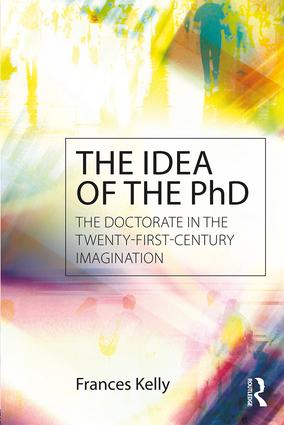
The Idea of the PhD: The Doctorate in the Twenty-First-Century Imagination
Additional Info:
Click Here for Book Review
The Idea of the PhD: The doctorate in the twenty-first-century imagination analyses the PhD as it is articulated in diverse areas of contemporary discourse at a time in which the degree is undergoing growth, change and scrutiny worldwide. It considers not just institutional ideas of the PhD, but those of the broader ...
Click Here for Book Review
The Idea of the PhD: The doctorate in the twenty-first-century imagination analyses the PhD as it is articulated in diverse areas of contemporary discourse at a time in which the degree is undergoing growth, change and scrutiny worldwide. It considers not just institutional ideas of the PhD, but those of the broader ...
Additional Info:
Click Here for Book Review
The Idea of the PhD: The doctorate in the twenty-first-century imagination analyses the PhD as it is articulated in diverse areas of contemporary discourse at a time in which the degree is undergoing growth, change and scrutiny worldwide. It considers not just institutional ideas of the PhD, but those of the broader cultural and social domain as well as asking whether, and to what extent, the idea of the Doctor of Philosophy, the highest achievable university award, is being reimagined in the twenty-first century.
In a world where the PhD is undergoing significant radical change, and where inside universities, doctoral enrolments are continually climbing, as the demand for more graduates with high-level research skills increases, this book asks the following questions:
How do we understand how the PhD is currently imagined and conceptualised in the wider domain?
Where will we find ideas about the PhD, from its purpose, to the nature of research work undertaken and the kinds of pedagogies engaged, to the researchers who undertake it and are shaped by it?
International in scope, this is a text that explores the culturally inflected representation of the doctorate and its graduates in the imagination, literature and media. The Idea of the PhD contributes to the research literature in the field of doctoral education and higher education. As such, this will be a fascinating text for researchers, postgraduates and academics interested in the idea of the university. (From the Publisher)
Table Of Content:
Introduction: The Doctor of Philosophy in the Twenty-First-Century Imagination
Ch 1. The nature of doctoral research
Ch 2. The idea of the PhD researcher
Ch 3. The idea of PhD pedagogy
Ch 4. The spaces of doctoral research
Concluding remarks: Future Imaginings
Click Here for Book Review
The Idea of the PhD: The doctorate in the twenty-first-century imagination analyses the PhD as it is articulated in diverse areas of contemporary discourse at a time in which the degree is undergoing growth, change and scrutiny worldwide. It considers not just institutional ideas of the PhD, but those of the broader cultural and social domain as well as asking whether, and to what extent, the idea of the Doctor of Philosophy, the highest achievable university award, is being reimagined in the twenty-first century.
In a world where the PhD is undergoing significant radical change, and where inside universities, doctoral enrolments are continually climbing, as the demand for more graduates with high-level research skills increases, this book asks the following questions:
How do we understand how the PhD is currently imagined and conceptualised in the wider domain?
Where will we find ideas about the PhD, from its purpose, to the nature of research work undertaken and the kinds of pedagogies engaged, to the researchers who undertake it and are shaped by it?
International in scope, this is a text that explores the culturally inflected representation of the doctorate and its graduates in the imagination, literature and media. The Idea of the PhD contributes to the research literature in the field of doctoral education and higher education. As such, this will be a fascinating text for researchers, postgraduates and academics interested in the idea of the university. (From the Publisher)
Table Of Content:
Introduction: The Doctor of Philosophy in the Twenty-First-Century Imagination
Ch 1. The nature of doctoral research
Ch 2. The idea of the PhD researcher
Ch 3. The idea of PhD pedagogy
Ch 4. The spaces of doctoral research
Concluding remarks: Future Imaginings
